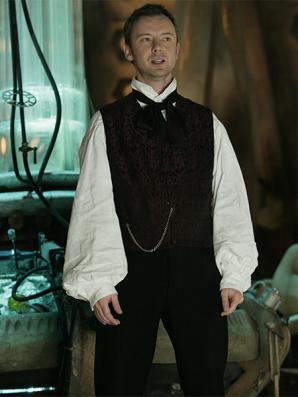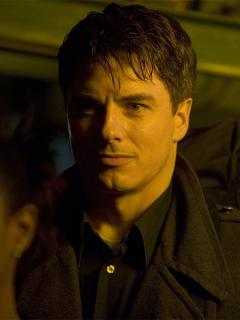
Series Three - Episode 11 - "Utopia".
STARRING: David Tennant, Freema Agyeman, John Barrowman
WITH: Derek Jacobi, and John Simm
ALSO STARRING:
Chipo Chung, René Zagger, Neil Reidman,
Paul Marc Davis, John Bell, Deborah MacLaren,
Abigail Canton, and Robert Forknall
Written by Russell T Davies,
Directed by Graeme Harper
Music - Murray Gold
Produced by Phil Collinson
Executive Producers: Russell T. Davies + Julie Gardner
Originally Transmitted 16th June 2007, BBC 1
The first in a series of retrospective reviews covering stories missing from the Doctor Who News archive.
The David Tennant incarnation of everyone's favourite twin-hearted iconoclast was enjoying a second full series on TV in 2007. Back then with Martha Jones as the able and beautiful new companion, played by up-and-coming star Freema Agyeman the show was continuing to provide excellent entertainment and role models for men and women in equal measure.
And overall, the production and writing crew began to combine the emotional weight of Series 1 with the heady hi-jinks of Series 2. At its peak, the Third Series of modern Doctor Who was the show at its very best, but it did still have some notably weaker efforts in places. To my mind, it was only the following year when showrunner Russell T Davies totally perfected the formula and came up with a great TARDIS crew, great one-offs, and a really fulfilling linking arc.
The Tenth Doctor/ Martha collection of travels and timelines, did however keep those viewers, who may still have missed the amazing chemistry that Tennant and Billie Piper shared on screen, engaged in the present. This episode of course, was one of the stand-outs, and did a terrific job of rewarding the loyalty of those too young to have experienced classic Who, but also came up with the return of a pivotal returning character that long-term watchers and committed fans alike were surely expecting to make another return to the fray. (And hopefully in a more traditional manner than the muddled Terminator homage of the TV Movie).
The Master makes his triumphant return in a fast-paced episode, by making the closing few minutes a powerhouse of revelation and dramatic chutzpah. And what a steal in getting none other than Derek Jacobi to guest star. Here he is just credited with the part of Professor Yana, obviously designed to preserve secrecy. It is an admirable '2 for the price of 1' effort, and succeeds in making the viewer remember this story as having a truly kind man succumb to a cruel twist of fate. Just as we could not dismiss the benign John Smith and think of him as a 'placeholder person', so we can never forget the combination of wisdom and boyish excitement that Yana has in this tale.
The 'Y.A.N.A. acronym' was of course one of the story-arc elements so elegantly laid out in prior episodes in Series 3. The other, and more deliberate hook was the 'Saxon' thread, which even stretched back to the preceding Christmas special - The Runaway Bride. The acronym stands for "You Are Not Alone", and could be read as a positive. For most of Utopia, Jacobi plays the most charming and likeable of people, in some ways even more engaging than the Doctor. Perhaps the message from the Face of Boe in Gridlock was meant as an encouragement. It also looks that way in the company Yana keeps. His own female assistant is very well performed by Chipo Chung, and in make-up terms a finely designed semi-humanoid, who employs a speech pattern of "Chan..tho" to bookend her statements. The two syllables form together to denote her name.
But it still is very clear that Utopia is overall a very bleak tale. Like Frontios, and a few other stories from the Who mythos (such as the recent Hell Bent), it is set at the end of time and sees a group of humans trying to proceed despite the odds being against them. A small camp of civilised people are having to guard against regressive beings, and they put all their hope in a great journey to another world. But of course they do not know if that world will have anything for them. And later episodes quickly confirmed the worst feelings of any TV viewer with an ounce of pessimistic suspicion in them.
Enough character development is spent establishing how close Yana and Chantho are together, that when the Master is unleashed by the spate of 'triggers' that lie within his subconscious, and despite the best intentions of the TARDIS crew, it really feels like a blow towards the captivated viewer. The ability to quickly make viewers care about 'supporting characters of the week' was one of Davies' finest assets in all of his TV writing, and not just this one prime time show. The way that Jacobi announces who he is, the sheer venom he hurls at the bewildered lab-coated and loyal ally of his previous persona, before fatally wounding her, is a moment of top notch thespian malice. "I am the ... Master" is a simple line of dialogue, made into something truly resonant.
David Tennant also has his moments of darkness at times in this story, most noticeably when the Doctor shrugs off the attempt of Captain Jack to re-forge their travelling partnership. In the process the former Time Agent makes his friend fully aware of the impact of being abandoned. He wanted some answers for what we were able to see were Rose's Time Vortex powers causing him to have the dubious superpower of being able to die and revive in the most traumatic of fashions. The Doctor's necessary regeneration into his Tenth self was a process that makes such a conversation with a former ally not the easiest of topics.
Ultimately it is a good thing we get Jack back after having all but no proper sign of him in the main show since The Parting of the Ways; the 'Torchwood' name being a verbal reminder over the course of Series 2. Barrowman makes the most of his opportunities in RTD's deft script, and is able to exude the energy of a man who has forged his own life, but still values the Doctor's friendship and mentorship highly. Even if many viewers did not see Torchwood the sister show in the interim, it matters little over the course of this episode and the next two, as enough exposition is made, without it being too obvious an advertisement for another BBC production.

The music from Murray Gold is typically strong in any given TV story, but this tale introduces one of my absolute favourite musical motifs. It clearly was seen as strong by those around Gold in post-production as it was to be repeated again in the concluding episodes of this third year to even great effect. Most notably featuring when the Doctor and Yana make progress as a team, it combines both the heroic and the melancholic to exquisite effect. There is also some frenetic up-tempo musical accompaniment to the action, where the heroes are on the run from the regressive outsiders, and this helps breath life into what flirts with being vaguely absurd.
Although the concept of the savages is a sound one, part of me finds their witless expressions and gnashing teeth somewhat out of synch with the intellectual and emotional complexity of the overall narrative. But if one was to just view them as a token monster and plot device then really this is just a tiny drawback.
Back to some praise again: the cliffhanger leading into The Sound of Drums is truly brilliant. We see a final blaze of glory for Jacobi as he defiantly cries "The Master ..Re-born", and then the most dangerously unpredictable and indeed disturbing regeneration yet is on the TV screen. Of course, in recent times Michelle Gomez has made the part her own and benefited from enough good scripts, great co-stars, (and crucially) screen-time to be that bit more nuanced than the John Simm incarnation. But make no mistake, the renowned Life On Mars actor is still fiendishly good and makes any given scene must-see TV. The ultra-confident, happy-chappy Doctor has now met his equal and opposite. However, it will take a journey or two into the past and across the cosmos, before they finally get their face-off in person.
Utopia is a fine piece of prime time TV in its own right, and it underlines the enterprise and craft of the production team in no uncertain terms. The mega-length finale had got off to a great start, and much more character development and high drama was just around the corner.







